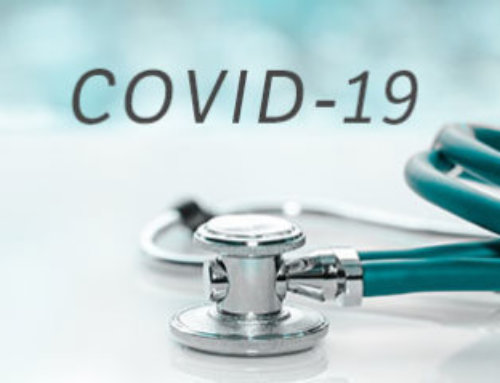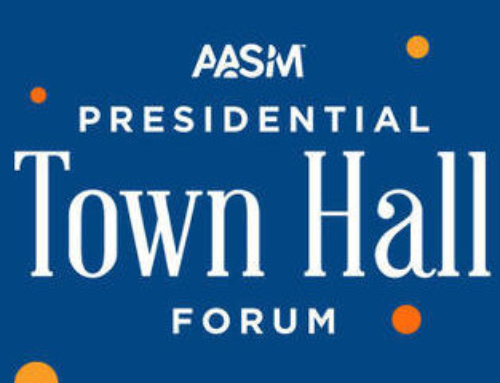The Centers for Medicare & Medicaid Services (CMS) announced on March 30 that it has released an interim final rule summarizing revisions to CMS processes allowing for increased flexibility in providing safe and effective care during the COVID-19 pandemic. The sweeping, temporary changes were made to promote the widespread use of telecommunications technology and avoid exposure risks to health care providers, patients, and the community during this outbreak. These regulations are applicable beginning March 1, 2020, lasting throughout the national public health emergency as declared by the secretary of Health and Human Services (HHS).
AASM staff performed an analysis of the interim final rule and identified the following policy changes that may impact sleep medicine professionals.
On an interim basis, CMS is finalizing that to the extent an NCD or LCD (including articles) would otherwise require a face-to-face or in-person encounter for evaluations, assessments, certifications or other implied face-to-face services, those requirements would not apply during the pandemic.
CMS is finalizing on an interim basis that the agency will not enforce the clinical indications for coverage across respiratory, home anticoagulation management and infusion pump NCDs and LCDs (including articles) allowing for maximum flexibility for practitioners to care for their patients. This policy includes NCD 240.4 Continuous Positive Airway Pressure for Obstructive Sleep Apnea. During the COVID-19 emergency, Medicare will cover CPAP devices based on the clinician’s assessment of the patient. However, once the public health emergency is over, CMS will return to enforcement of the clinical indications for coverage.
To the extent NCDs and LCDs require a specific practitioner type or physician specialty to furnish a service, procedure or any portion thereof, CMS is finalizing on an interim basis that the Chief Medical Officer (CMO) or equivalent of the facility can authorize another physician specialty or other practitioner type to meet those requirements during the public health emergency for the COVID-19 pandemic. The CMO of a facility can also authorize that supervision requirements do not apply at this time.
Medicare telehealth services can now be provided to patients wherever they are located, including in the patient’s home. However, when telehealth services are provided in places not identified as permissible originating sites, no originating site facility fee will be paid.
Physicians and practitioners who bill for Medicare telehealth services should report the Place of Service (POS) code that would have been reported had the service been furnished in person. This will allow CMS systems to make appropriate payments for services rendered via Medicare telehealth that would have been provided in person, if not for the COVID-19 pandemic.
CMS is also finalizing, on an interim basis, the use of the CPT telehealth modifier, Modifier 95, which should be applied to claim lines that describe services furnished via telehealth. Note: CMS will retain the facility payment rate for services billed using the general telehealth code for those that choose to maintain their current billing practices during the pandemic.
CMS has also expanded the list of telehealth services, to ensure that patients have access to clinically appropriate treatment during this public health emergency. Codes newly designated as telehealth codes during the COVID-19 pandemic include:
- Initial and Subsequent Observation and Observation Discharge Day Management (CPT codes 99217- 99220; CPT codes 99224- 99226; CPT codes 99234- 99236)
- Initial hospital care and hospital discharge day management (CPT codes 99221-99223; CPT codes 99238- 99239)
- Critical Care Services (CPT codes 99291-99292)
- Initial and Continuing Intensive Care Services (CPT code 99477- 994780)
- Care Planning for Patients with Cognitive Impairment (CPT code 99483)
- Psychological and Neuropsychological Testing (CPT codes 96130- 96133; CPT codes 96136- 96139)
- Clinical psychologist services can be paid for as Medicare telehealth services.
View the complete list of Medicare Telehealth Services.
CMS previously limited critical care consultations through telehealth to only once per day, given the patient acuity involved in critical care, but this restriction is now being removed.
CMS is now adding exception language that will last for the duration of the public health emergency, which states that “interactive telecommunications system to multimedia communication equipment that includes at a minimum, audio and video equipment permitting two-way, real-time communication between the patient and a distant site physician or practitioner.”
During the pandemic, the Health and Human Services (HHS) Office for Civil Rights (OCR) is also waiving penalties for HIPAA violations against health care providers who serve patients in good faith through everyday communication technologies such as FaceTime or Skype.
CMS finalized separate payment for services that can be furnished via telecommunications technology, but are not considered Medicare telehealth services:
- G2010 (Remote evaluation of recorded video and/or images submitted by an established patient (e.g., store and forward), including interpretation with follow-up with the patient within 24 business hours, not originating from a related E/M service provided within the previous 7 days nor leading to an E/M service or procedure within the next 24 hours or soonest available appointment)
- G2012 (Brief communication technology-based service, e.g. virtual check-in, by a physician or other qualified health care professional who can report evaluation and management services, provided to an established patient, not originating from a related E/M service provided within the previous 7 days nor leading to an E/M service or procedure within the next 24 hours or soonest available appointment; 5-10 minutes of medical discussion)
Interim changes regarding these codes are as follows:
- On an interim basis, during the pandemic, CMS is finalizing that these codes, which can only be reported if they do not result in a visit, may now be applied to both new and established patients.
- CMS recently finalized that consent to receive these services needed to be documented annually. However, CMS will now consent to be obtained at the same time the service was provided and will also allow auxiliary staff to document patient consent to receive these services under general supervision.
CMS is broadening the availability of G2010 and G2012 so practitioners including clinical psychologists can utilize these services to facilitate the best available appropriate care while mitigating exposure risks.
CMS is revising the definition of direct supervision to allow, for the duration of the pandemic, direct supervision to be provided using real-time audio and video technology.
- For telehealth services that need to be personally provided by a physician, such as an E/M visit, the physician would need to personally perform the E/M visit and report that service as a Medicare telehealth service.
- Other services, including both face-to-face and non-face-to-face services, could be provided incident to a physicians’ service by a nurse or other auxiliary personnel, as long as the billing practitioner is providing appropriate supervision through audio/video real-time communications technology (or in person), when needed.
To facilitate the ability of RHCs and FQHCs to use interactive communications technology, when appropriate and on an interim basis, CMS is expanding the services that can be included in the payment for HCPCS code G0071 (Payment for communication technology-based services for 5 minutes or more of a virtual (non-face-to-face) communication between an RHC or FQHC practitioner and RHC or FQHC patient, or 5 minutes or more of remote evaluation of recorded video and/or images by an RHC or FQHC practitioner, occurring in lieu of an office visit; RHC or FQHC only), which is reported for Virtual Communication Services, by adding the following three CPT codes:
- 99421 (Online digital evaluation and management service, for an established patient, for up to 7 days, cumulative time during the 7 days; 5-10 minutes)
- 99422 (Online digital evaluation and management service, for an established patient, for up to 7 days, cumulative time during the 7 days; 11-20 minutes)
- 99423 (Online digital evaluation and management service, for an established patient, for up to 7 days, cumulative time during the 7 days; 21 or more minutes)
CMS is revising the payment rate for HCPCS code G0071 to include the national non-facility payment rates for these three new codes. The RHC and FQHC face-to-face requirements will be waived for these services.
Remote Physiologic Monitoring (RPM) services are considered Communication Technology-Based Services and have historically only been billable for established patients. In response to CDC guidance, CMS is finalizing, on an interim basis, that RPM services can be furnished to new patients, as well as established patients. The agency is also finalizing, during the duration of the pandemic, that consent to receive RPM services can be obtained once annually, including at the time services are furnished. RPM codes can be used for physiologic monitoring of patients with both acute and chronic conditions.
RPM codes commonly reported by sleep medicine professionals include:
- 99091 (Collection and interpretation of physiologic data digitally stored and/or transmitted by the patient and/or caregiver to the physician or other qualified health care professional, qualified by education, training, licensure/regulation requiring a minimum of 30 minutes of time)
- 99457 (Remote physiologic monitoring treatment management services, clinical staff/physician/other qualified health care professional time in a calendar month requiring interactive communication with the patient/caregiver during the month; first 20 minutes)
Existing telephone Evaluation and Management (E/M) Services have been historically designated as Non-covered services by CMS because they are not face-to-face and because the code descriptors include language that recognizes the provision of services to parties other than the beneficiary for whom Medicare does not provide coverage (i.e., a guardian). During the public health emergency, CMS is finalizing separate payment for Telephone E/M service codes 98966-98968 and 99441-99443, with work RVUs recommended by the AMA.
| CPT Code | Work RVU |
| 98966 | 0.25 |
| 98967 | 0.50 |
| 98968 | 0.75 |
| 99441 | 0.25 |
| 99442 | 0.50 |
| 99443 | 0.75 |
CMS also finalized that these codes may be reported by practitioners including clinical psychologists.
CMS is revising policy, on an interim basis, to specify that office/outpatient E/M level selection for services when furnished via telehealth can be based on Medical Decision Making (MDM) or Time, with time defined as all of the time associated with the E/M on the day of the encounter; and to remove any requirements regarding documentation of history and/or physical exam in the medical record, consistent with the policy that will be applied for E/M visits in 2021. To reduce confusion, CMS is maintaining the current definition of MDM and is finalizing the current typical times associated with the E/M visits. This applies only to those visits furnished via Medicare Telehealth and only during the pandemic.
For the duration of the pandemic, CMS is amending its regulations to state that the services of residents that are not related to their approved GME programs and are performed in the inpatient setting of a hospital in which they have their training program are separately billable physicians’ services for which payment can be made under the Physician Fee Schedule. Residents must be fully licensed to practice medicine, osteopathy, dentistry, or podiatry by the state in which the services are performed.
CMS is applying the MIPS automatic extreme and uncontrollable circumstances policy to MIPS eligible clinicians for the 2019 performance period/2021 MIPS payment year. CMS is also extending the deadline to submit an application for reweighting to April 30, 2020, or a later date CMS may specify. This extended deadline mirrors the MIPS data submission deadline extension. This extended deadline is available only for applications that demonstrate the clinician has been adversely affected by the public health emergency.
CMS is also creating an exception for the 2019 performance period/2021 MIPS payment year only, such that if a MIPS eligible clinician demonstrates through an application submitted to CMS that they have been adversely affected by the public health emergency for the COVID-19 pandemic, but also submits data for the quality, cost, or improvement activities performance categories, the performance categories for which data are submitted would still be reweighted (subject to CMS’ approval of the application), and the data submission would not effectively void the application for reweighting. A similar exception is being created for the Promoting Interoperability performance category for the 2019 performance year/2021 payment year.
In light of the public health emergency and the inability to project the impact it may have in the future on CMS’ abilities to ensure timely payment, and the potential challenges for suppliers to prepare and submit claims to CMS contractors, CMS is revising the definition of advance payment to state that the conditional partial payment will be made by the “contractor” (not the carrier). Additional changes regarding advance payments include:
- Language is being added to permit payments under an exception.
- Language is being added to specifically address emergency situations in which it will be able to make advance payments.
- CMS is increasing the limit from 80 percent to 100 percent of the anticipated payment of a claim based on the historical assigned claims payment data for claims to be paid to the supplier.
- A criterion is being added that suppliers in bankruptcy will not be eligible to receive advance payments to ensure that CMS is able to appropriately pay and recover advance payments made to Part B suppliers.
Learn more about the interim final rule and waivers on the CMS website. Additional information is available in these CMS fact sheets:
Get additional information about the recent CMS expansion of Medicare coverage for telemedicine.
Submit coding and reimbursement questions to the AASM at coding@aasm.org.








